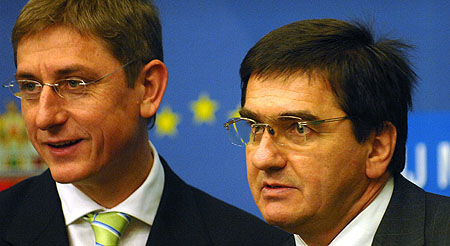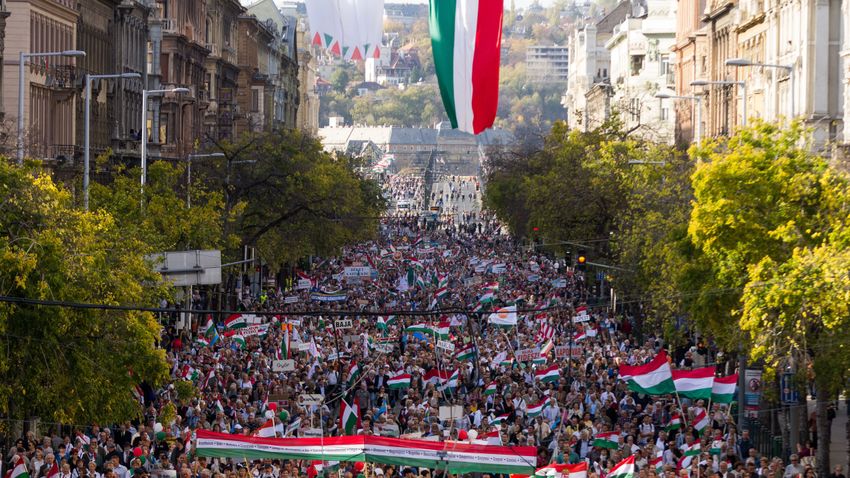PM lied about actual state of the economy
In essence, the Hungarian government concealed the true budget figures from the European Union in the period preceding the national general elections.
The Hungarian prime minister deceived not only Hungarian voters preparing to cast their ballots, but also the European Union, the Budapest City Court ruled. After the leaking of the speech [2006], in which the prime minister admitted that he had lied „morning, noon and night” and withheld facts from the populace for months, proof also came to light that
the government had also concealed the actual state of the country’s economy from the European Union.
As reported by V4NA in a previous article, tens of thousands of people took to the streets for months in protest after the prime minister’s leaked address – popularly dubbed the „Oszod speech” – in which he revealed that he had deliberately misled the public for one and a half years. „I almost perished because I had to pretend for eighteen months that we were governing,” he said.

A demonstrations took place continuously from September 2006 onward, with tens of thousands of people demanding the resignation of the socialist prime minister, Ferenc Gyucsany.

The protests were crushed with brutal methods and the Hungarian premier asked his party „to find a new prime minister” only years later, in 2009.
Government also lied to the EU
It soon became evident that the admission of lies meant that Mr Gyurcsany and his government duped not only Hungarian voters to win the 2006 elections, but that he also deceived the European Union. The Budapest City Court ruled that the Gyurcsany government acted unlawfully in forwarding the EU’s statistical office (EUROSTAT) in 2006 only national budget deficit figures that had previously been approved by the finance ministry.
Since the actual magnitude of the budget deficit had been concealed from the EU’s leadership during the period preceding the national parliamentary elections,
Brussels audited the convergence programme submitted by the Gyurcsany government.

Former PM Ferenc Gyurcsany and his Finance Minister Janos Veres
Gyurcsany’s government was due to release first quarter preliminary budget data before the first round of the general elections, which would have revealed that
the deficit had already reached 60 per cent of the planned full-year deficit target by the fourth month of the year.
Janos Veres, then finance minister, admitted as much when he told the news portal Index in June 2006, that the annual budget deficit would amount to 9.4 per cent of GDP instead of 4.7 per cent as originally projected. “On exactly where we stand and how we stand, (…) I had not allowed this kind of work to be done before. It was our experience that if a memo was made and it got out, it became a political issue. That is why this kind of complex assessment could not be done as long as there was a risk of it [political issue],” Gyurcsany’s finance minister explained.
The finance ministry had to adjust the deficit target of 1156 billion forints (3.2 billion euros), which was declared to the EU in April, to practically double, 2163 billion forints (5.99 billion euros) in October, meaning that
the Gyurcsany government concealed a deficit overrun of more than 1000 billion forints (2,76 billion euros) from the EU.
Peace March on the scene of police terror

After the change of government in 2010, Hungary began to emerge from the crisis as a result of the Orban government’s measures, however, it also came under increasing attack from Brussels. At that time, a group of civilians decided to organise a Peace March – a large-scale demonstration in support of the government, one of the organisers, Laszlo Csizmadia, head of the Civil Cohesion Forum and Civil Cohesion Public Benefit Foundation (COF-COKA), told the Hungarian news portal Origo.
As he said, by the end of 2011, they sensed that “the Orban government is under political and financial attack from Brussels. They [Brussels] obviously did not like the fact that a patriotic government came to power in Hungary, and indeed – relatively quickly – we got rid of our debts while not taking on new loans.”
„In response to the attacks from Brussels, we called on people to come out and show that we are on the side of the Orban government, because we believe that things are finally going in the right direction for the country,” he explained.
Since then, seven Peace Marches have been organised, with the eighth taking place this year, on 23 October – 15 years after the events in 2006 and symbolically at the site of Gyurcsany’s police terror.
The head of COF-COKA said that this year’s Peace March will have several important messages:
“One is for the country’s domestic opposition, who are gnawing away at Hungary from the inside; the other is for Brussels. The third – and very important – goal is to show that Hungary’s economic performance is so good at the moment, that neither attacks from Brussels, nor from domestic sources are acceptable.”
Tags:

